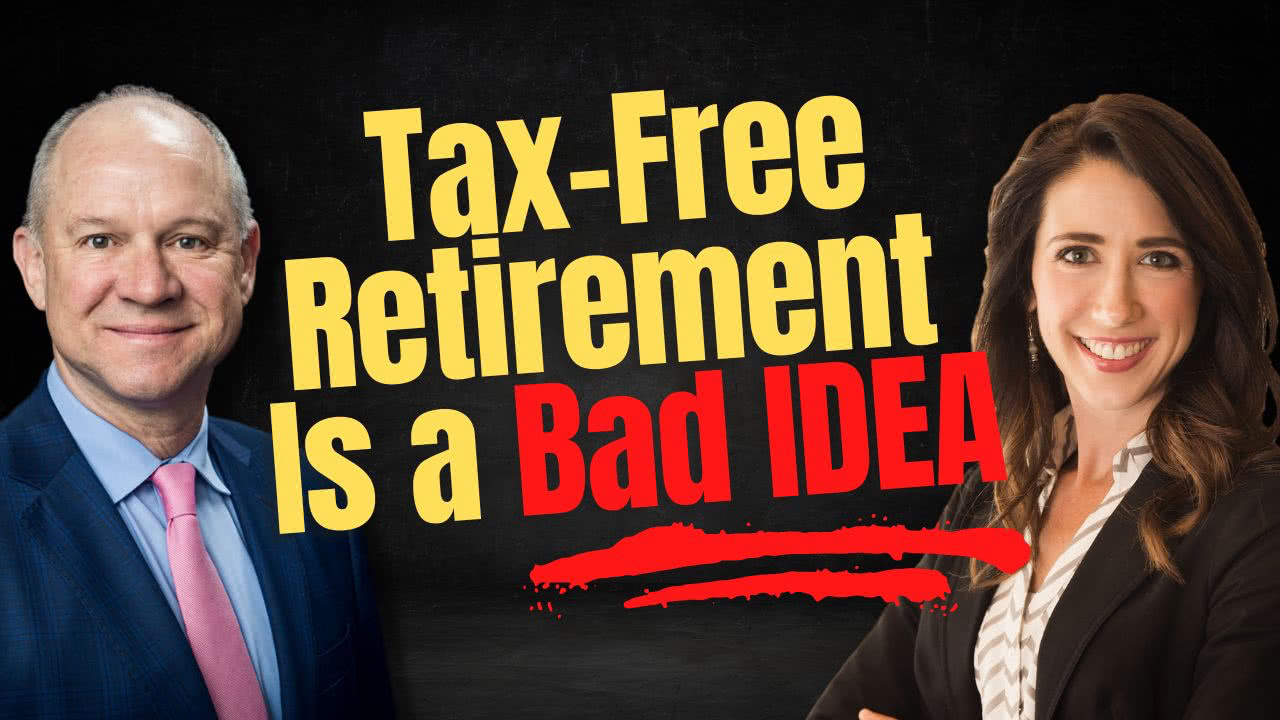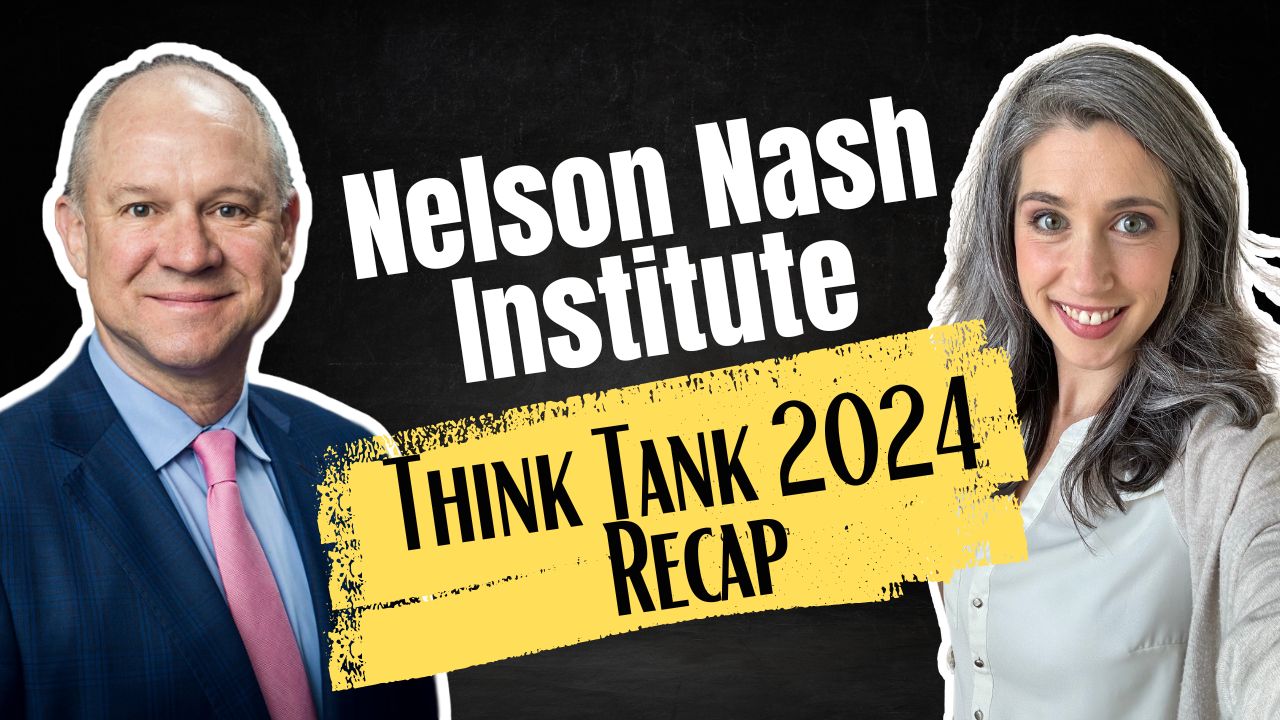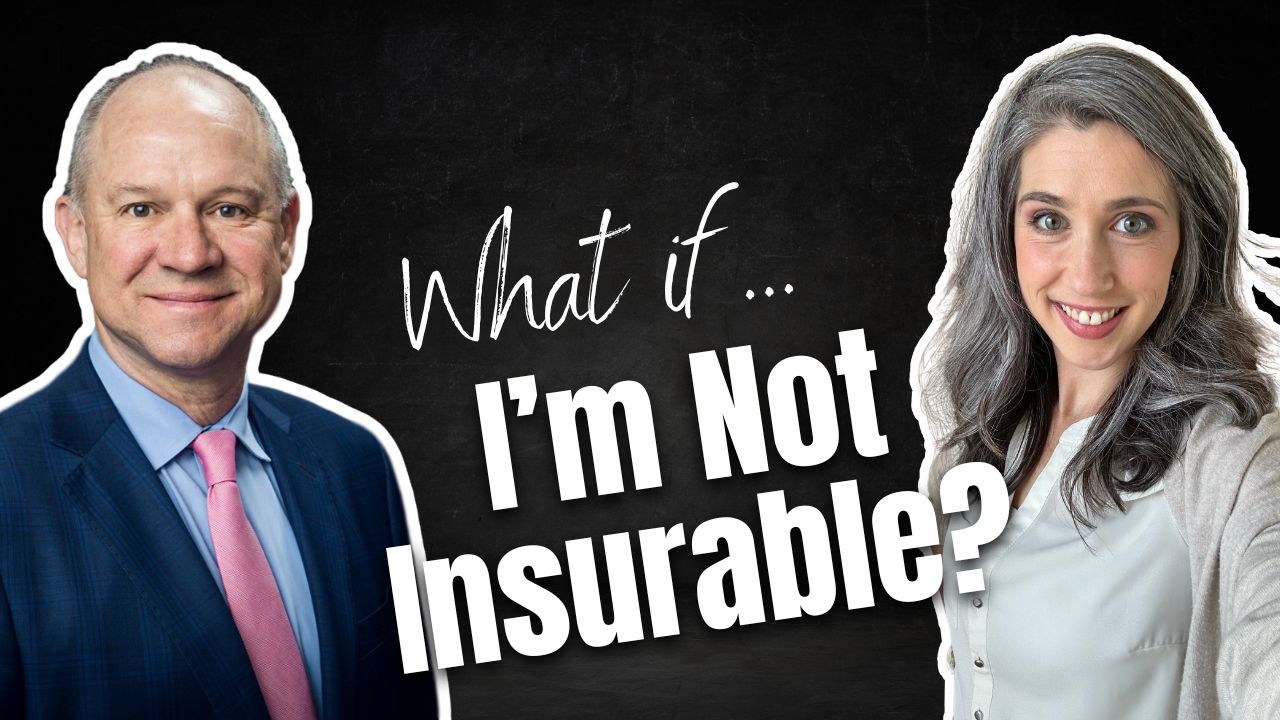
Tax-Free Retirement is a Bad Idea
Want tax-free retirement income? Tax-free money in retirement sounds amazing… at first glance.
But before you dive into this strategy, there are three things you need to know about why “Tax-Free Retirement” is a really bad idea.
To find out exactly why you shouldn’t set up your financial game plan for tax-free retirement… tune in now!
Podcast: Play in new window | Download (Duration: 1:06:22 — 76.0MB)
Subscribe: Apple Podcasts | Spotify | Android | Pandora | RSS | More
Table of contents
Setting Frameworks
When you’re presented with a certain lens or framework, it’s important to step back and consider:
- Where is the information coming from?
- Who does this benefit?
- What are the other options?
These questions can go a long way in helping you determine whether a strategy is a good fit for you, whether it has merit, and how you should approach it.
The idea of tax-free retirement using whole life insurance is popular. Just the name alone makes it sound amazing. So why wouldn’t someone want to implement it? Keeping the above questions in mind, we’re going to unpack the nuances of this approach so that you can use that information to better your strategy.
What is Tax-Free Retirement?
The general idea of tax-free retirement is that you have set up a whole life insurance policy for maximum cash value growth that you can use for retirement income. The strategy suggests that after maximally funding a policy, you can choose to retire and use that cash value for retirement income. You use a certain formula to determine how much you can withdraw each year over a certain timeframe (instead of borrowing against it) without creating a taxable event.
The premise is that by saving into a whole life insurance policy, you can pull an income from your policy without paying taxes. And while this is true, there are certain disadvantages that people don’t often consider or discuss.
“Don’t Let the Tax Tail Wag the Dog”
This concept comes from Garrett Gunderson, author of Killing Sacred Cows.
[14:10] “He talks about how you cannot ever make all of your financial decisions on the basis of, ‘How do I pay the least amount of tax?’ If you’re just looking at taxes, that’s a lens being put in front of your eye [saying], ‘Here’s the most important thing.’ Really, there’s not one most important thing; there’s a lot of factors that you need to consider.”
When you only make financial decisions out of the fear of paying taxes, you’re acting from a place of scarcity. The scarcity mindset doesn’t serve you, because it prevents you from seeing other options or strategies that may be even better for you, depending on the purpose of your dollars.
If you want to leave a large legacy to your children, but you choose a “tax-free retirement” strategy out of fear, you run the risk of disinheriting your children. This, of course, is not the outcome you want if you’re aiming for a legacy. So it’s important not to let fear dictate the lens through which you take financial action.
Retirement is a Concept that Needs Fixing
Let’s consider the typical retirement paradigm. Generally, you work from about age 20 or so until you’re somewhere between 60 and 70. In all of those working years, you work as hard as possible to make as much as possible. And hopefully, you save as much as possible. Then, when you’re ready to retire, you stop working completely and live off of what you’ve saved. You probably intend to continue living life at the same level of comfort and quality, so you take about the same income that you made when you had a job.
Unfortunately, many people only save about 10-20% of their income. But, they still want to live at 100% of what they’re used to. This means retirees are going through their money quickly—even with a tax-free retirement strategy.
[15:30] “The main reason why retirement is a really bad idea in the first place is that if you are stepping out of a position of working, you’re putting yourself out of service. To retire literally means to put out of use. And that means you’re in a position of no longer contributing to society in a way that is providing the value so that you can have an income. That’s putting you in a position of isolation.”
It’s also a poor perspective of work because work shouldn’t be drudgery. You have the potential to create meaningful, fulfilling work.
How to Change Retirement
This isn’t to say that you have to have the same career forever. You don’t even have to work in the same capacity in your career forever. We simply want to encourage people to show up in the world by creating value. The income naturally follows.
Choosing this path of service also serves to keep you healthy, mentally active, and connected to your fellow humans. It’s a blessing to live this way, not only to you, but to all the people you bless. This type of thinking provides incredible relief in what would be our retirement years because you’re less concerned with running out of money (on top of these other excellent benefits).
So Why Shouldn’t You Do Tax-Free Retirement?
You may be thinking, “Sure, I’m not going to retire in the literal sense. But I might slow down or do something different when I’m 70. Why wouldn’t I want to do a tax-free retirement strategy to supplement that?”
One reason is that you could lose out on tax exemptions by not having your money in a taxable position. When you take a tax-free income, your income on your return is zero, which sounds great. You owe nothing to the IRS. However, you don’t get to benefit from the $25,900 deduction (for joint filers) either. They don’t pay that out to you because you didn’t have enough taxable income to offset. So it’s just lost.
In other words, you’re losing the opportunity to take about $25,900 of taxable income each year without paying the taxes. The reason this is valuable is that you can take that money from any taxable account, and experience it without paying taxes. If you take a tax-free income from your whole life insurance, though, you’re limited to what you can withdraw without modifying the tax status of your policy.
You have the potential to create a much more robust economic environment for yourself if you’re not just thinking about taxes. Thinking about your business, your investments, your income, and the strategies you employ to make them synergistic are all critical components of wealth building.
Why Tax-Free Income is Not the Best First Solution
Even after all this, you might think that taking tax-free income still sounds like a great idea for retirement. We’d like to suggest that it shouldn’t be your first solution. Hopefully, from the above information, you can see that we’re not against this strategy as a whole. We simply want to help you expand your idea of what’s possible, and how there are many things to consider besides taxes.
A critical strategy at any stage of life is to diversify. Often, this is only applied to investments. However, you can apply this to any aspect of your financial life. We’d even suggest that it’s better applied to your income and assets than an investment portfolio.
The reason is that you want to have three things: safety, liquidity, and growth. Most assets can only achieve one or two of those things. That’s why one strategy you might want to employ is a volatility buffer. That’s when you pull income from securities, a 401k, or other correlated accounts during “green” years. Then, in lean years (when there’s a downturn in the market), you can pull from your life insurance. This extends the life of both accounts and makes your income last much longer.
Life Insurance is Insurance
Another reason we recommend not relying on life insurance as your first resort for income is because it’s insurance. You’re buying insurance for the purpose of guarantees—guaranteed premium, guaranteed death benefit, and guaranteed cash value. It’s a tool for insurance first, and cash benefits second.
When you use life insurance as your first and only source of income, you run the risk of losing those benefits. If you want to leave a death benefit to your kids, eating up your policy risks leaving them with nothing. If you live to your endowment age, you run a similar risk.
Life insurance is a great supplementary tool to everything else you have going on. It makes your investments better, and that includes your retirement strategy. Life insurance gives you so many options when you have it and use it as a supplement. When you use it as your sole strategy, you severely limit your options.
Book A Strategy Call
Do you want to coordinate your finances so that everything works together to improve your life today, accelerate time and money freedom, and leave the greatest legacy? We can help! Book an Introductory Call with our team today https://themoneyadvantage.com/calendar/, and find out how Privatized Banking, alternative investments, or cash flow strategies can help you accomplish your goals better and faster. That being said, if you want to find out more about how the Infinite Banking Concept gives you the most safety, liquidity, and growth… plus boosts your investment returns, and guarantees a legacy, go to https://privatizedbankingsecrets.com/freeguide to learn more.
Nelson Nash’s Legacy: Think Tank 2024 Recap
Embark on a transformative financial odyssey with us as we reflect on our profound experiences at the Nelson Nash Think Tank for 2024. Unlock the doors to personal economic empowerment with the Infinite Banking Concept (IBC), a brainchild of the late Nelson Nash that revolutionizes the use of dividend-paying whole life insurance. We shed light…
Read MoreBecoming Your Own Banker, Part 25: Uninsurability Hacks
Do you want to use Infinite Banking, but you’re uninsurable? Today we are discussing uninsurability hacks! Don’t worry, uninsurability ISN’T a game-stopper for using Infinite Banking to build your own banking system. That means you can still reap the exponential reward of dividends and interest that grow with uninterrupted compounding, store liquid cash reserves that…
Read More


